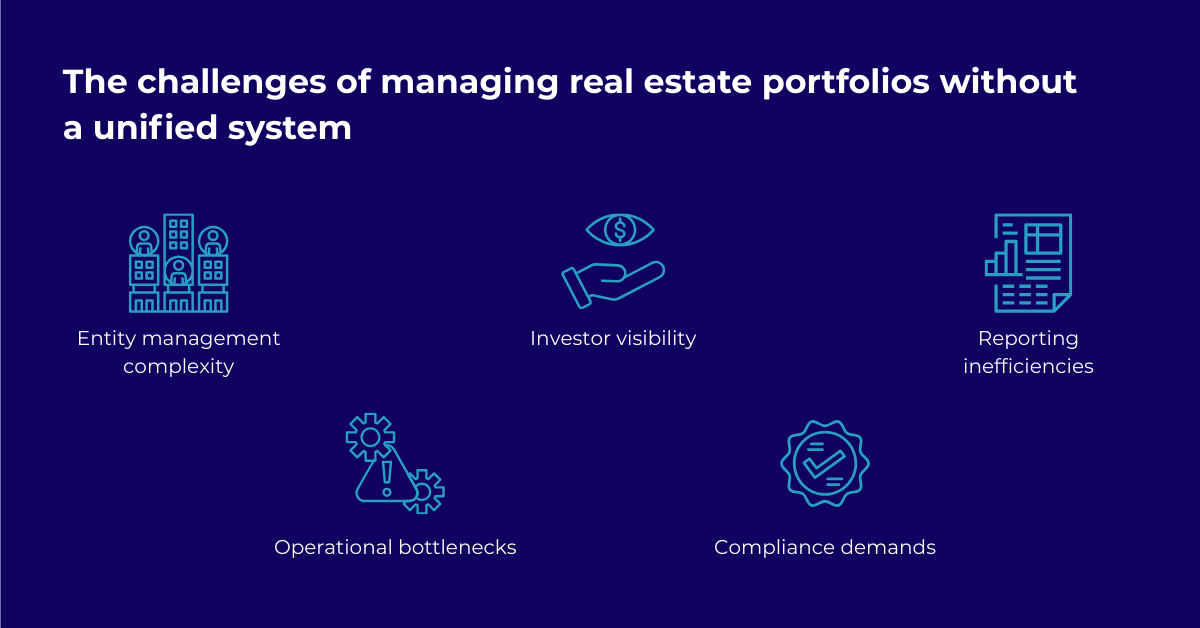
Why Private Equity Real Estate Firms are Standardizing on Business Central as their ERP of Choice
- August 27, 2025


Private equity real estate firms operate in a fast-moving environment. They manage multi-entity portfolios, oversee complex transactions, and must balance investor expectations with operational efficiency. At the same time, the sector is experiencing mounting pressure from rising interest rates, increased reporting requirements, and investor demands for faster, more transparent insights. This has necessitated that firms identify an ERP for real estate with the right functionality and support to empower their future growth.
In this landscape, the choice of technology platform matters. More firms are moving away from legacy accounting systems and fragmented reporting solutions to adopt Microsoft Dynamics 365 Business Central; a cloud ERP platform designed for growth, scale, and control. What stands out is not just that these firms are moving to Business Central, but that they are standardizing on it across their portfolios. This blog explores why this shift is happening, the benefits firms are experiencing, and how Domain 6 supports the transition with real estate–specific accelerators.
Real estate private equity is fundamentally about scale and structure. A firm may start with a few assets and investors, but growth quickly leads to multiple special purpose vehicles (SPVs), joint ventures, and entities across states or even countries. Without a unified system, the pain points multiply:
These challenges make it clear why firms are searching for a platform that simplifies operations and scales with growth.

Microsoft Dynamics 365 Business Central (BC) has emerged as the ERP solution that strikes the right balance for private equity real estate firms. Here’s why it stands out:
1. Built for multi-entity operations
Business Central allows firms to manage multiple entities in one platform. Intercompany transactions, eliminations, and consolidations are handled natively, reducing manual work and errors. For firms juggling dozens of SPVs, this feature alone eliminates hours of reconciliations each month.
2. Real-time reporting and analytics
Instead of waiting weeks for Excel-based consolidations, executives can view consolidated financials in real time. With integrations to Power BI, firms can deliver visual dashboards to investors or internal stakeholders that track asset performance, cash flow, and occupancy metrics across the portfolio.
3. Seamless integration with Microsoft 365
Private equity teams live in Outlook, Excel, and Teams. Business Central integrates directly with these tools, meaning less context switching and more efficient collaboration. Accountants can generate reports in Excel, review approvals in Outlook, or collaborate on projections in Teams without leaving the ERP.
4. Scalable for growth
As firms raise new funds or acquire more assets, Business Central grows with them. There’s no need to purchase separate systems for each new entity—everything is standardized within the same platform.
5. Lower total cost of ownership Compared to maintaining multiple instances of legacy systems or investing in custom-built platforms, Business Central offers a cost-effective, subscription-based model. Firms get enterprise-level capabilities without the overhead of legacy ERP.
It’s one thing to adopt Business Central for one fund or portfolio company. It’s another to standardize on it as the go-to ERP for real estate. Standardization creates measurable benefits:
In short, standardization turns technology from a back-office tool into a strategic enabler of growth.
Adopting Business Central is powerful, but needs expert support and embedded solutions to truly stand out as an ERP for real estate. This is where Domain 6’s real estate accelerators come in.
Domain 6 has developed accelerators that tailor Business Central to the needs of real estate private equity firms. These include:
Technology adoption is only successful when paired with the right approach. Domain 6 helps firms define requirements, align stakeholders, and manage change to ensure adoption sticks.
Private equity firms often rely on multiple systems—property management software, investor portals, or data warehouses. Domain 6 specializes in integrating Business Central with these systems, creating a seamless data flow across the firm’s ecosystem.
Standardization is not a one-time project. Domain 6 provides ongoing support, enhancements, and advisory services so firms can continue to evolve their ERP as they scale.
The benefits of this approach are tangible. Private equity real estate firms working with Domain 6 have reported:
By moving to Business Central with Domain 6’s accelerators, these firms are not just keeping up with operational demands, they are building the foundation for future growth and investor confidence
The decision to standardize on Business Central is not only about solving today’s challenges. It sets the stage for what’s coming next. As AI becomes embedded in ERP systems, firms with standardized, clean data will be the first to benefit. Predictive cash flow modeling, automated variance analysis, and AI-driven investor insights will become standard features.
Firms that delay modernization will find themselves stuck with fragmented systems and incomplete data—making it nearly impossible to adopt advanced tools when investors demand them. Standardizing on Business Central now ensures private equity firms stay ahead of the curve.
Private equity real estate firms are under increasing pressure to deliver operational efficiency, transparency, and growth. Legacy systems and fragmented processes can’t keep up. By standardizing on Microsoft Dynamics 365 Business Central, firms are not only streamlining their accounting and reporting but also positioning themselves for long-term success.
With Domain 6’s real estate accelerators and advisory expertise, the transition becomes faster, smoother, and more aligned with the unique needs of the industry. The result is a strategic move that supports scale, enhances investor confidence, and prepares firms for the AI-powered future of finance.
